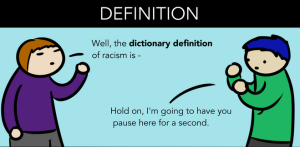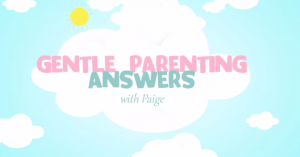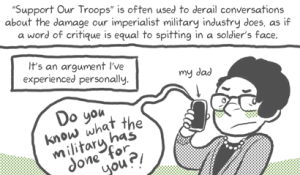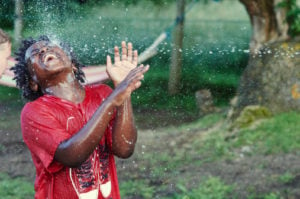
Photo of two people smiling (Courtesy of Vanessa Mártir and Katia Ruíz)
This article originally appeared in The Huffington Post and was republished here with the author’s permission.
Reentering the dating universe can be a little bumpy, as most anyone can tell you. First, you have to negotiate what you want and need within yourself, and then turn outward to see what the beautiful world has to offer you. I am still in the “negotiating within myself” phase.
But in my case, one thing is sure, I am a femme woman attracted to masculine women and in particular, butches.
Recently, I had a first date with a brilliant woman I perceived to be masculine of center, but I was fairly confident she didn’t identify as butch.
As I sat on her couch with a cocktail in hand, entering into the kind of exploratory conversation that lays down the beginning structure of getting to know someone, she said, “I’m not sure. You seem to be strongly into butch–femme, and I don’t identify that way. I’m not into the roles.” I had heard this concern before.
I’m not entirely sure what people mean when they reference “the roles,” but it made me want to define butch–femme relationships for myself, acknowledging that there’s a vast spectrum of how people express themselves as individuals and in relationship to each other.
I assume when people talk about roles, they are thinking along the lines of something my mother told me when I was young when I asked her what a lesbian was. She said, “Two women get together, and one of them pretends to be a woman, and one of them pretends to be a man.”
I’ve always gotten a good chuckle out of that definition, because it is so wrong and so right at the same time: butch–femme is not about pretending, or playing at roles.
It’s a natural expression of feminine and masculine expressed within an interconnected sexuality that sometimes feels like a tango — intense and dramatic, and incredibly romantic.
Some people think the butch–femme dynamic is a dying identity, but I beg to differ. Butch–femme lives and evolves and is a legitimate choice for relating and connecting with a sexual partner.
A tired criticism of butch–femme is that it tries to mimic a patriarchal relationship structure, with a powerful male figure, and a submissive female figure. As a femme lesbian, I can tell you that I like to get my nails done, wear dresses when I want to look beautiful, and always keep a lipstick in my purse. But I am also incredibly strong and self-sufficient.
Every femme I know is a strong badass – not some weak, simpering facsimile of a 1950s housewife. And if I sometimes choose to take a submissive role in a sexual situation, it’s to serve my own pleasure, not to give up my power.
While some butches are also fiercely strong, they often have a soft core. They can be protective and caring, qualities that require a nurturing nature. We are yin and yang – seemingly oppositional forces that are actually complementary and interconnected.
We offer a devoted appreciation for the gender expression of the other, an affirmation of intrinsic qualities that make us who we are. Each of us is unique, with our own blend of characteristics along a gender spectrum. We all carry both masculine and feminine aspects within ourselves.
So if femmes are strong and self-sufficient badasses that choose to be soft with their butches, and butches are nurturers that protect and pleasure their femmes through their expressions of masculinity, how does that resemble the patriarchy of old?
When I am with a masculine partner, my sense of feminine power is intensified. Rather than feeling subordinate or weak, I feel a heightened sense of self. Her masculinity not only contrasts my femininity but amplifies it. Within the butch–femme dance, I feel appreciated for my very essence.
My every curve is a path to explore; my flirtations, bold or demure, are received and returned with equal desire. I want my partner to be strong and a gentleman, but that’s not a role. That’s a way of being.
Another way to look at this is that I want my partner to treat me well and to validate my feminine expression. In order for a person who is butch-identified to be a good partner to me, they must love deeply, wish to protect my heart, and respect my intellect and rightful sense of self-determination.
Recently I found a huge spider in my laundry room. My initial reaction was to scream. Then I pulled out a tape measure to document its size, and then I killed it. I posted the picture of the spider next to the tape measure on Facebook and captioned it, “Yes, I did scream like a little b*tch.”
First, a butch friend of mine asked if I’d held the tape measure up myself to take the picture, and when I proudly took credit, she told me I had balls. I take pleasure in breaking the expectations of what a femme can do and be.
Another friend, Lea Arellano, a Two-Spirit medicine person, said, “Little bitches are sacred and to be cherished.” This comment made me unreasonably happy, for this is the spirit that someone who loves femmes comes forth to offer.
Femmes are sacred and to be cherished. Butches are sacred and to be cherished.
I’ve dated a masculine, ultra-protective woman who would never call herself butch. I’ve dated a 6’2” basketball player who would never call herself butch. I loved a romantic dreamer who proudly claimed her butch identity. I was married to a trans butch who, after 17 years together, transitioned.
What I really care about is who the person is, how they treat me, if they want to tango, honor my femme identity, and let me honor their masculinity. I, too, reject roles.
I love butch–femme and the particular dynamic that exists when two people feel firmly rooted in whatever gender identity the desire, even when they are interconnected in a dance of complementary opposites. Do I ever feel I am playing a role or being anything other than my deepest, most authentic self? No, never.
The divine feminine in me likes to see the divine masculine in my partner – and it is both a spiritual and sexual connection that cannot be denied.
Whether we call ourselves by certain labels or not, it is deeply authentic and compelling. What matters is that powerful spark that ignites when two people see into each other’s truest essence.
[do_widget id=’text-101′]
Georgia Kolias is a California based writer currently shopping her manuscript, The Feasting Virgin, a culinary novel featuring a quirky Greek American foodie who struggles to reconcile her religious beliefs with her emerging sexuality. She holds an MFA/MA in Creative Writing. She regularly blogs for The Huffington Post, where her posts have been featured in the Parents, Queer Voices, Impact, Entertainment, and Wedding/Divorce sections. Her work has appeared in the Advocate.com, The Manifest-Station, Role Reboot, When Women Waken, and various anthologies. You can find her at www.georgiakolias.com, on Facebook at Georgia Kolias, Author and on Twitter @georgiakolias.
Search our 3000+ articles!
Read our articles about:
Our online racial justice training
Used by hundreds of universities, non-profits, and businesses.
Click to learn more




















